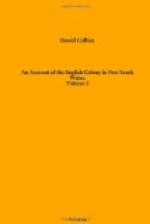Still alarming depredations were nightly committed upon the live stock of individuals, and were doubtless effected by those wandering pests to society; the regulations which had long since been established as a check to such an evil being wholly disregarded. It was discovered, that hogs were stolen, and delivered on the victualling days at the public store, without any enquiry being made, as to whose property they were, or by whom delivered, any person’s name which they chose to give in being considered by the store-keeper as sufficient to authorise him to receive it, although printed vouchers for the delivery of such pork (and grain likewise) were left at the store, for the purpose of being signed by the party offering it. This certainly operated as an encouragement to the commission of these thefts; and it became necessary to order, that such persons as attended the receipt of any of these articles at the store should direct whoever delivered them to sign the voucher of the quantity received by him, the governor being determined never to approve of any bill laid before him for that purpose, unless the commissary should produce the voucher, properly signed, by the person in whose name such bill was made out.
About the middle of this month a general muster was made of all the inhabitants in the different districts of the settlement; and the governor, attending in person, collected from the settlers an accurate state of their farms and grounds in cultivation. This he did with a view of transmitting, in his next dispatches to Government, such an account of these people as, from being taken under his immediate inspection, might be depended upon. From the 14th to the 24th were taken up in this enquiry, from the result of which it appeared that there were in the district of the River Hawkesbury: 2544 and a half acres in wheat, 907 acres for maize; in the district of Parramatta: 1259 and a half acres in wheat, 663 and a half acres for maize; in the Sydney districts: 538 and a half acres in wheat, 365 and a half acres for maize; making a total of 4392 acres and a half in wheat, and 1436 acres for maize, in the three principal districts of the settlements.
At the Hawkesbury, the greatest quantity of ground in cultivation by any individual, who had from a convict become a settler, was fifty-one acres, forty-six of which were in wheat. Two others had fifty each, forty of which were in wheat. A man of the name of Flood (who, had been left by Mr. Hogan, when here in the ship Marquis Cornwallis in 1796, in the care of some ground which that gentleman had purchased) had at this time two hundred, and an agent of Mr. Palmer the commissary, had within seven of three hundred, acres in wheat. There were but few sheep in the possession of the settlers of this district, and about two hundred and forty goats. Hogs were more numerous, there being, after all the slaughter which had lately taken place among these animals, nearly two thousand




